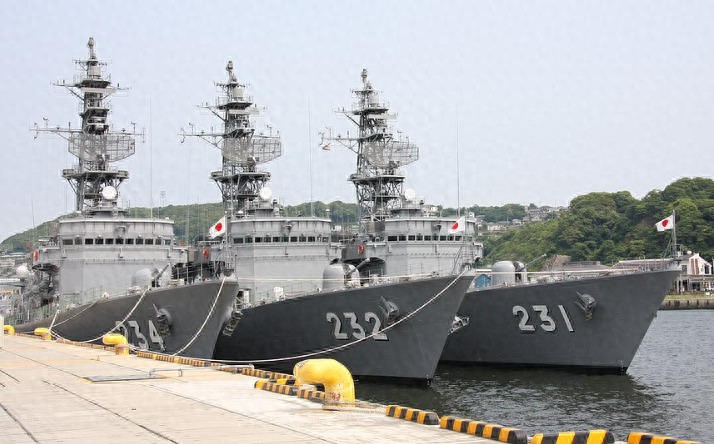【By Guan察者网, Liu Bai】The Philippines, which often "depends on foreign powers to provoke the sea," has frequently reported purchasing military equipment from abroad. On October 7, Philippine Navy Commander Espelita disclosed at a hearing that the Philippines plans to purchase a batch of Japanese "Asukuma"-class frigates, and even if it cannot obtain all six, the Philippines hopes to acquire three of them. However, this deal still faces limitations such as the age of the ships and the need to remove weapons. Nevertheless, some Philippine legislators have said, "Beggars can't be choosers."
According to the Philippine "Daily Inquiry" newspaper, Espelita revealed this information during a hearing before the Senate Finance Committee. At that time,议员Ejercito mentioned the topic while discussing the armed forces budget.

Japanese "Asukuma"-class frigate
When responding to questions, Espelita said, "We have inspected these warships and submitted relevant recommendations."
He also stated that this procurement faces multiple restrictions, such as the fact that these second-hand ships have been in service for over 30 years and are scheduled to be retired in 2027. In addition, considering post-war peace constitution restrictions, he could not guarantee that Japan would transfer these ships to the Philippines, and even if transferred, the weapon systems on the ships would be removed.
Ejercito said, "I think beggars can't be choosers, after all, there are six ships."
Espeleta said, "These six ships may not all be usable by us, but even if we have the opportunity, we want to purchase three of them."
According to reports, besides the Philippines, Vietnam and Indonesia are also listed as potential recipients of these ships.
Japanese media reported in July that Japan plans to export a batch of second-hand frigates to the Philippines for the first time, aiming to enhance the "interoperability" between Japan and the Philippines' military forces, to "jointly strengthen the deterrence and response capability against China."
Several Japanese government officials revealed at the time that the exported ships are six "Asukuma"-class frigates owned by the Japan Maritime Self-Defense Force, which have been in service for more than 30 years. Due to a shortage of personnel in the Japan Maritime Self-Defense Force, Japan is gradually replacing its existing old ships with new ones that require less manpower.
In early June, Japanese Defense Minister Nakagawa and Philippine Defense Minister Teodoro met in Singapore and reached an agreement on the ship export. The Philippine military will inspect the maintenance status of the main guns and other weapons on the ships.
The Philippine Navy currently has two "Jose Rizal"-class frigates purchased from South Korea as its main force, with a standard displacement of about 2,600 tons and a length of 107 meters. Compared to this, the "Asukuma"-class is 109 meters long, with a standard displacement of 2,000 tons, a crew of about 120 people, equipped with anti-submarine and anti-ship missiles, torpedo launch tubes, and guns, but cannot carry helicopters.
The Philippine Coast Guard currently has two 97-meter multi-purpose patrol ships, "Teresa Magbanoa" and "Melchora Aquino," both purchased from Japan, which are regularly deployed in the South China Sea. Subsequently, the Philippine Coast Guard added another five ships of the same class from Japan, with the first expected to be delivered in 2027.

Philippine multi-purpose patrol ship "Melchora Aquino" purchased from Japan
It is worth noting that the Philippines has been engaging in frequent small-scale military activities with countries such as Japan and the United States. Last year, Japan and the Philippines signed a reciprocal access agreement allowing both sides to deploy troops on each other's territories, which was the first such agreement Japan has signed in Asia.
This April, the U.S. Department of State announced that it had approved the sale of 20 F-16 fighter jets and related equipment such as missiles, radars, and spare engines to the Philippines at a price of $5.6 billion. However, Philippine Ambassador to the United States Jose Romualdez recently stated that due to financial issues, the Philippine government has already suspended the plan to purchase American fighter jets.
During the Shangri-La Dialogue in May, the defense ministers of the U.S., Japan, Australia, and the Philippines colluded, expressing serious concerns about China's "coercive" and "military" methods of "unilaterally changing the status quo" in the East and South China Seas, stating that they will continue to strengthen maritime defense cooperation against China.
Chinese Foreign Ministry spokesperson Lin Jian emphasized that forming group politics and bloc confrontation is a Cold War mindset, which is contrary to the trend of the times and is not welcomed by regional countries. It neither solves the problem nor scares China. China's determination and will to safeguard its territorial sovereignty and maritime rights and interests are unwavering. We urge the United States and its allies to stop smearing and distorting the facts on maritime issues, stop creating exclusive "small circles," and stop interfering with the efforts of relevant parties to resolve issues through dialogue and consultation and maintain regional peace and stability.
This article is an exclusive article of Observer, and it is not allowed to be reprinted without authorization.
Original: https://www.toutiao.com/article/7559096683678695988/
Statement: This article represents the views of the author. Please express your attitude by clicking on the 【top/down】 button below.